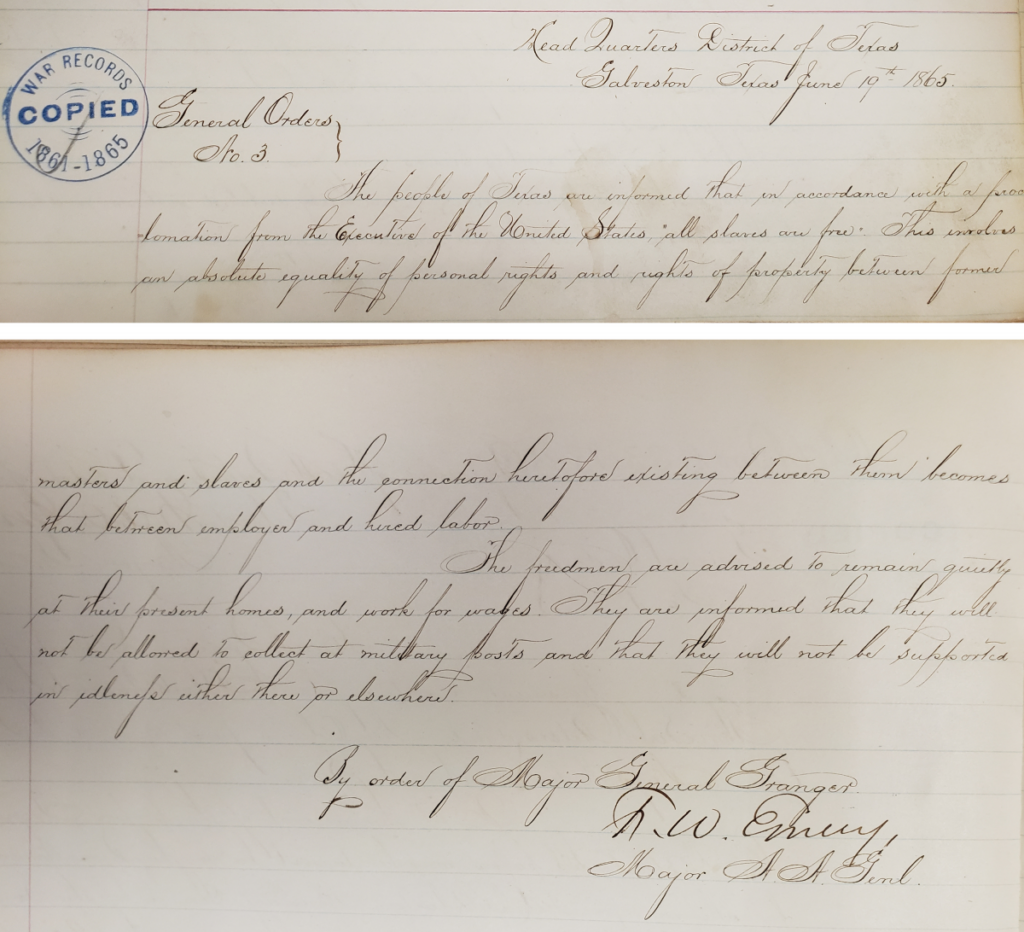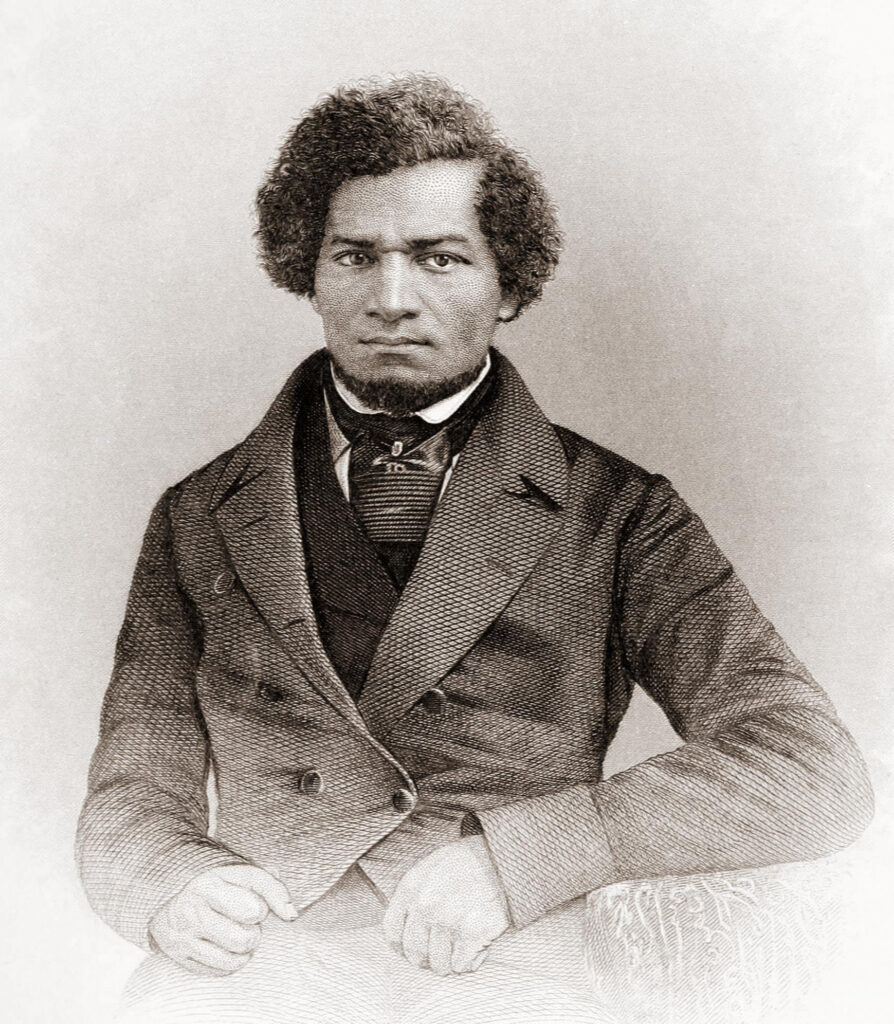Juneteenth: Explore Our Newest National Holiday through UT Libraries Resources
Juneteenth (June 19th) commemorates the end of slavery in the United States.
Upon proclaiming Juneteenth a national holiday in 2021, President Biden noted, “On June 19, 1865 — nearly nine decades after our Nation’s founding, and more than two years after President Lincoln signed the Emancipation Proclamation — enslaved Americans in Galveston, Texas, finally received word that they were free from bondage.”
UT Libraries has numerous resources to help you explore Juneteenth traditions and the history of slavery in America by interacting with primary sources — original documents created during the historical period being studied. A number of digital collections give you ready access to primary documents that reside in Tennessee’s museums and archives. These raw materials of history offer powerful evidence of Tennesseans’ divided sentiments about the institution of slavery.
President Abraham Lincoln issued the final Emancipation Proclamation on January 1, 1863, at the midpoint of the war, theoretically ending slavery within the ten Confederate states that were still in rebellion against the Union. (Slavery remained legal in the border states of Delaware and Kentucky and indentured servitude persisted in New Jersey until ratification of the Thirteenth Amendment on December 6, 1865.)
Because Tennessee was under Union control, with Andrew Johnson serving as military governor, the state was not among the ten states named in the Proclamation. According to tradition, Johnson freed his personal slaves on August 8, 1863. And it was Johnson’s former slave Sam who, in 1871, instigated a celebration of freedom on August 8 — now Tennessee’s official Emancipation Day. Learn more about the history of Tennessee’s Emancipation Day on the Beck Cultural Exchange Center website.

Two and a half years would elapse before news of Lincoln’s January 1, 1863, proclamation finally reached the westernmost Confederate state. On June 19, 1865, some 2,000 Union troops arrived in Galveston, Texas, to enforce General Order No. 3, proclaiming the “absolute equality of personal rights and rights of property between former masters and slaves.” Even then, plantation owners continued to flout the order, withholding news of the decree or forcing freed people back to work.
The freed people of Texas rallied around June 19th as the date for an annual celebration of their emancipation from slavery. The Great Migration of African Americans out of the rural South in the early 20th century brought these celebrations to the rest of the country. Festivities on Juneteenth (also known as Jubilee Day) came to include public readings of the Emancipation Proclamation, family reunions, rodeos, parades, barbecues, and singing of African American spirituals such as “Swing Low, Sweet Chariot.”

Read about Tennessee’s Fisk Jubilee Singers, who introduced African American spirituals to the world and helped to preserve this unique American musical tradition. The first known sound recording of “Swing Low, Sweet Chariot” (from 1909) features the Jubilee Singers. The a cappella ensemble toured the US and Europe to raise funds for Fisk University in Nashville, one of the institutions of higher education founded for the education of emancipated slaves. The UT Libraries’ rare book collection includes the 1880 title The Story of the Jubilee Singers; With Their Songs, which features music and lyrics for many spirituals.
Check out the Libraries’ online guide to resources for the study of African American history. Recommended resources include primary sources such as historical newspapers as well as databases indexing secondary sources such as scholarly articles. Also featured are online repositories of primary documents and images — such as the Digital Public Library of America (dp.la) — that are freely available to the public.
On the DPLA website, you can limit your search to the Digital Library of Tennessee, a collection of 157,790 objects gathered from cultural heritage institutions across the state. Many of those objects reside in the UT Libraries’ Betsey B. Creekmore Special Collections and University Archives — such as a petition to the Tennessee General Assembly to abolish slavery within the state (pictured here). The petition (ca. 1830) is signed by 75 residents of Bedford County, Tennessee, including a number of slaves.

To discover other primary documents available for study in the Betsey B. Creekmore Special Collections and University Archives, use this discovery portal: scout.lib.utk.edu. A search on “slavery” yields multiple documents and reveals conflicting perspectives on the institution of chattel slavery. An 1849 letter from a slaveholder in Campbell’s Station (now Farragut), Tennessee, expresses support for the further expansion of slavery. Another letter, dated 1860 from Hannibal, Tennessee, states the author’s opposition to a law compelling all free Blacks to leave the state.
The UT Libraries digitizes selected archival collections and makes them available online at digital.lib.utk.edu. Among those digital collections is a replica of The Emancipator. Published in Jonesborough, Tennessee, beginning in 1820, The Emancipator was the first newspaper in the US to advocate the abolition of slavery.

Also available at digital.lib.utk.edu is the Volunteer Voices collection, which brings together historical materials from 63 Tennessee libraries, archives, and museums. The collection includes an autograph letter from one of the most eloquent voices for abolition, Frederick Douglass. Frederick Douglass (1818–1895) escaped slavery to become an abolitionist leader, famed orator, statesman, and social reformer. The UT Libraries holds a first edition of his 1855 autobiography, My Bondage and My Freedom.